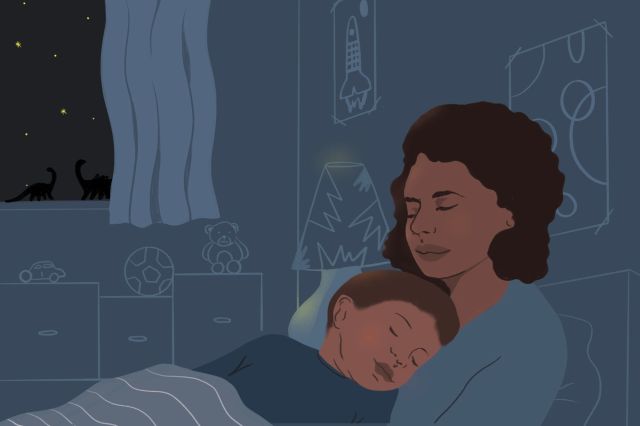If we look beyond modern Western culture and recent human history, then the simple answer is, yes, it is normal for children to experience varying independent sleeping skills. From an anthropological viewpoint, parents—particularly mothers—sharing their sleep space with their young children is a centuries-old practice. And in some cultures, sleeping alone doesn’t occur until adulthood.
“Teaching our kids to sleep alone at a young age is a unique piece to Western culture and one that we often teach because we want our children to have experiences that require independent sleep skills, such as slumber parties and sleepaway camps,” says Emily McMason parent, coach, and sleep consultant at Evolving Parents.
Though it really does come down to personal preferences and the health of your family. If soothing your child to sleep or co-sleeping is what results in the best rest, then there’s little reason to change it while your child is very young. However, if it’s not working or you believe your child is old enough to begin an independent sleep routine, there are some steps you can take that do not involve traumatic experiences for you or your child.
According to Dr. Lynelle Schneeberg, pediatric sleep psychologist, assistant professor at the Yale School of Medicine, and fellow of the American Academy of Sleep Medicine, “Children often develop a sleep-onset association—also known as a sleep crutch. If you’re always there when your child falls asleep or co-sleep, they begin to pair parental presence with their ability to fall asleep. So, when you’re ready to teach independent sleep skills, start by figuring out what their sleep crutch is and gradually remove these things from their routine.”
In Dr. Schneeberg’s book Become Your Child’s Sleep Coach: The Bedtime Doctor’s 5-Step Guide, Ages 3-10, she recommends small steps such as placing a body pillow between you and your child, giving them a nighttime toy to sleep with, and moving them to their own bed but staying in the room until they learn to fall asleep without the need for your presence.
Furthermore, helping children understand the sleep cycles—that often differ for each family member—and providing a reason for them to be excited for sleeping on their own is an effective tool. And one that Emily McMason recommends, encouraging parents to help children understand why uninterrupted sleep is important with phrases such as “your body needs peaceful sleep to grow, and I can’t wait to see how much bigger you are in the morning!”
Whether you decide it’s time to transition your child to sleep on their own or want to embrace your child’s sleep dependencies, remember that the choice and experience are uniquely yours, and it’s unlikely you’ll be their sleep crutch forever.
RELATED STORIES:
Is This Normal? My Toddler Refuses to Eat
Want to Raise Confident Kids? Start by Doing This
Is This Normal? My Kid Won’t Eat Dinner Then Begs for Snacks Before Bed











